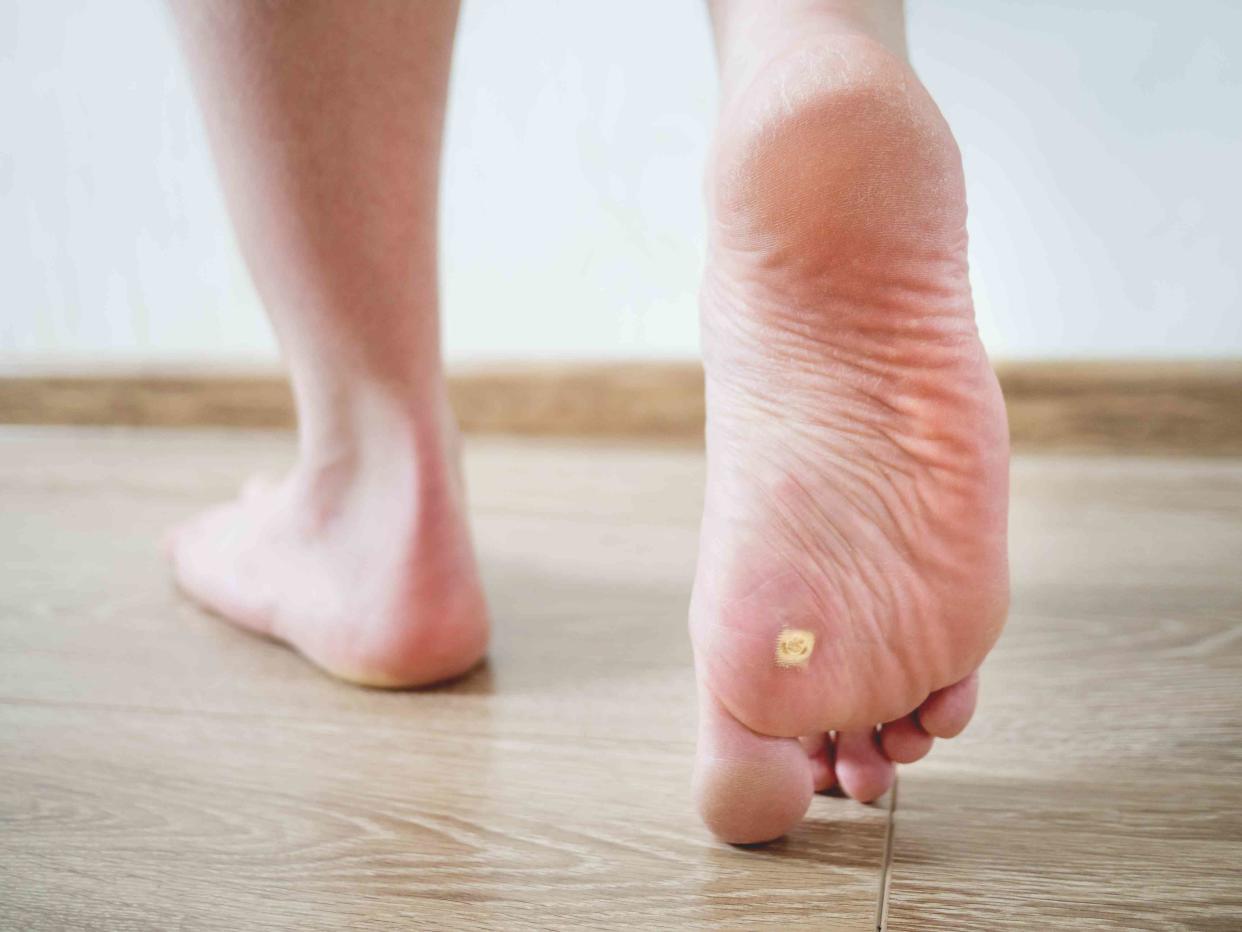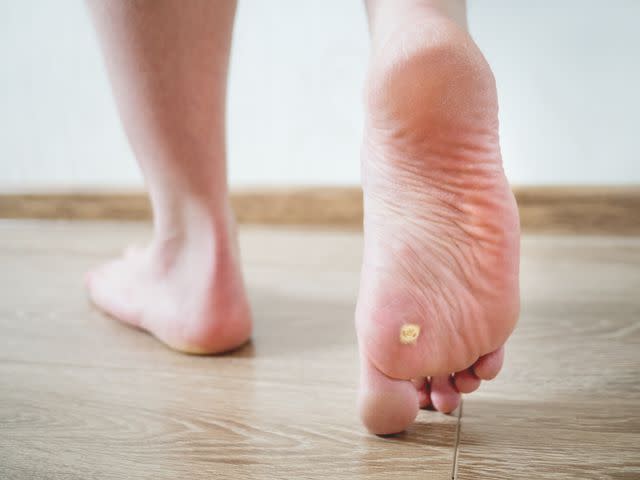How Plantar Warts Are Treated

Konstantin Aksenov / Getty Images
Medically reviewed by Leah Ansell, MD
While some plantar warts go away on their own, others may require treatment. Dermatologists (doctors specializing in treating skin conditions) can freeze, burn, or surgically remove warts in their office.
Laser treatment, injections, and chemicals may be necessary for stubborn warts. However, some people find that over-the-counter (OTC) treatments and home remedies work well for smaller warts.
This article explains plantar wart home remedies, OTC treatments, prescriptions, and procedures.

Konstantin Aksenov / Getty Images
Home Remedies
Warts have no overnight cure; treatment usually takes weeks, not hours. Common at-home treatments for plantar warts include covering the wart with duct tape and strategies to prevent further occurrences on yourself and others.
Duct Tape
Duct tape is sometimes used to cover a wart and peel away the wart's layers over time. However, there is little evidence to support this remedy. Research comparing topical preparations, duct tape, and placebo (a purposely inactive treatment) in children found that duct tape did not perform better than the placebo.
Duct tape side effects may occur in some people, which include:
Redness
Itching
Bleeding
Prevention
Since warts are caused by the human papillomavirus (HPV), they can spread to other parts of your body or to others. So, whether you treat a wart at home (or at all), prevention strategies can help keep the wart from spreading.
Dermatologists recommend:
Avoiding picking or scratching warts
Wearing flip-flops in public locker rooms and pool areas
Not touching other people's warts or letting them feel yours
Keeping the wart and the area around it dry
Covering warts with a bandage is a good way to avoid accidentally scratching or exposing them to others. Preventing warts from spreading is often the only treatment many require. Generally, untreated warts won't hurt you. However, if your wart causes discomfort or you have many of them, you should see a healthcare provider for an evaluation and treatment.
Over-the-Counter Therapies
There are many OTC products for treating plantar warts, with most containing salicylic acid. A healthcare provider can also prescribe salicylic acid in a stronger form.
Salicylic acid is in a class of medications called keratolytic agents. It is one of the primary plantar wart treatments. It works by softening and loosening dry skin so it can come off more easily. Salicylic acid is available OTC and is applied topically.
In one study, researchers noted that salicylic acid cleared warts about 50% of the time. The treatment duration varied from six to 17 weeks.
Experts recommend using 17% salicylic acid. Before applying, bathe the skin for five minutes to soften it. Next, apply the topical salicylic acid daily for 12 weeks. Avoid use on the face.
Related:The 6 Best Wart Removers of 2023
Surgeries and Specialist-Driven Procedures
If you don't successfully get rid of warts on your own at home or with OTC treatments, you should see a healthcare provider. They have many methods of treating warts in their office.
Cantharidin
Cantharidin is a topical application applied by a healthcare provider. It works by causing a blister to form under the wart. About a week after the application, you return to the office, where the wart will be clipped off.
Cryosurgery
Cryosurgery (cryotherapy) involves spraying liquid nitrogen onto the area to freeze it. It is one of the first-line treatments for warts. It may be preferred because it is quick, easy, and inexpensive. However, side effects include pain, discoloration, scars, and relapses. Cryotherapy has a cure rate of between 39% and 92%.
Electrosurgery
Electrosurgery is a therapy in which a healthcare provider uses an electric current to burn off a wart. In one study comparing cryotherapy and electrosurgery, researchers found the treatments were similarly effective. Electrosurgery had a 75% clearance rate, while cryotherapy was 73%. However, wart recurrence at 24 weeks recurred slightly more often in the electrosurgery group.
Curettage
Curettage is often used with other treatment methods, like freezing or burning. During this procedure, a healthcare provider will use a knife or spoonlike tool to scrape off the wart gently.
Excision
If a healthcare provider wants to biopsy your wart, they will likely do an excision (surgical removal). This allows them to get the borders and enough material for lab analysis.
Laser Treatment
Laser therapy may be an option when warts don't respond to other treatments. A study found that laser therapy had a cure rate of 85%. However, the effects varied depending on the location of the wart. For example, on the heel, the rate was 100%, but on the front part of the foot, it was 69%.
Chemical Peels
Peeling medicines can be applied in the office or prescribed to use at home. These peeling agents may include TCA and salicylic acid.
Anticancer Agents
While warts aren't usually cancerous, they still respond to some anticancer medicines, including bleomycin and interferon. These are both injectable medicines that can be painful.
Immunotherapy
Immunotherapy uses your immune system to fight the wart. One medication in this category is diphencyprone (DCP), which causes a mild allergic reaction around the wart, causing it to go away. Another option is candida antigen injections.
Complementary and Alternative Medicine (CAM)
Complementary and alternative treatments for warts generally have limited evidence supporting their effectiveness.
Some natural remedies people use for warts include:
Apple cider vinegar (ACV) applied topically: No direct evidence supports ACV for warts. However, ACV does have antimicrobial properties at a total concentration.
Garlic applied topically: In a randomized controlled trial, researchers found that those who used lipid garlic extract on their warts achieved a 96% response rate.
Bee propolis applied topically: Research found that propolis cured plantar warts at a rate of 75% and common warts at a rate of 73%.
Tea tree oil applied topically: A study evaluated its effectiveness in treating HPV (which causes warts) and found a strong antioxidant effect.
While the evidence is limited for CAM, some people like to try them before using more invasive approaches.
